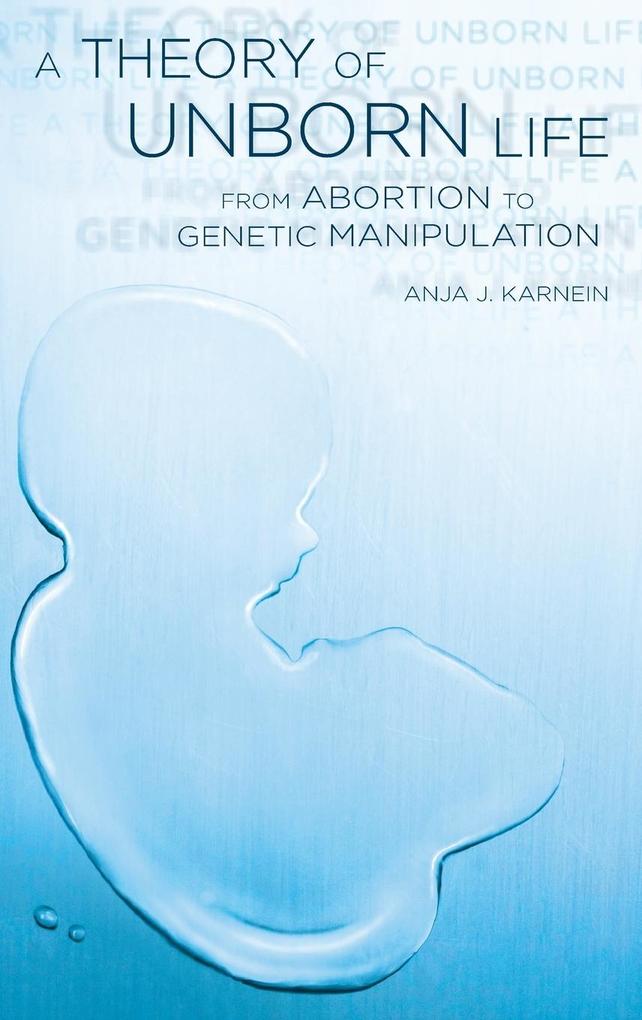
Zustellung: Sa, 31.05. - Do, 05.06.
Versand in 2 Wochen
VersandkostenfreiBestellen & in Filiale abholen:
In light of new biomedical technologies, such as artificial reproduction, stem cell research, genetic selection and design, the question of what we owe to future persons-and unborn life more generally-is as contested as ever. In A Theory of Unborn Life: From Abortion to Genetic Manipulation, author Anja J. Karnein provides a novel theory that shows how our commitments to persons can help us make sense of our obligations to unborn life. We should treat embryos that will develop into persons in anticipation of these persons. But how viable is this theory? Moreover, what does it mean to treat embryos in anticipation of the future persons they will develop into? Exploring the attractiveness of this approach for Germany and the U.S. - two countries with very different legal approaches to valuing unborn life-Karnein comes to startling conclusions to some of today's greatest ethical and legal debates.
Inhaltsverzeichnis
- Table of Contents
- Introduction
- Part I: Creation and Destruction
- Chapter One - Embryos and Future Persons
- 1. Protecting Persons
- 2. Why Birth Matters
- 3. The Moral Value of Embryos that will be Born
- 4. The Moral Value of Embryos that will not be Born
- 5. Conclusion
- Chapter Two - The Human Dignity of Embryos? The German Case
- 1. The German Abortion Debate
- 2. Embryo Protection in Tort and Criminal Law
- 3. The Law for Protecting (Some) Embryos
- 4. The Stem Cell Law
- 5. Conclusion
- Chapter Three - The Moral Anonymity of Embryos: The American Case
- 1. The U.S. Abortion Debate
- 2. Tort Law: Prenatal Injury Cases
- 3. Criminal Law and the Fetus
- 4. Artificial Reproductive Technologies and Stem Cell Research
- 5. Conclusion
- Part II: Selection and Manipulation
- Chapter Four - The Limits of Reproductive Choice and Distributive Justice
- 1. Championing Procreative Liberties: John A. Robertson
- 2. Embracing Scientific Advance: Ronald Dworkin
- 3. Insuring Equal Opportunity: Buchanan et al.
- 3.1. Genetic Manipulation, Justice, and Our Moral System
- 3.2. Limiting Parental Powers: Respecting a Child's Right to an Open Future
- 3.3. The Danger of Intergenerational Domination
- 4. Conclusion
- Chapter Five - Troubling Intuitions: Jürgen Habermas and the Dangers of Changing Human Nature
- 1. Habermas's Rejection of Liberal Eugenics
- 2. Irreversibility, Responsibility, and Appropriate Attitudes
- 3. The Anthropological Foundation of Morality
- 4. Conclusion
- Chapter Six - Future Persons and their Independence
- 1. Precarious Intergenerational Relationships
- 1.1. The Non-Identity Problem
- 1.2. Determining the Nature of Intergenerational Relationships
- 2. The Importance of Independence
- 2.1. Natural and Substantial Independence
- 2.2. Independence and Disability
- 2.3. Independence v. the Significance of Dependence
- 2.4. Independence v. Autonomy
- 2.5. Independence as a Non-Contingent Notion
- 2.6. Independence and the Future of Morality
- 3. Who is Responsible? Exculpating Parents
- 4. Conclusion
- Bibliography
- Index
Produktdetails
Erscheinungsdatum
14. Juni 2012
Sprache
englisch
Seitenanzahl
208
Autor/Autorin
Anja J Karnein
Verlag/Hersteller
Produktart
gebunden
Gewicht
420 g
Größe (L/B/H)
250/167/23 mm
ISBN
9780199782475
Entdecken Sie mehr
Bewertungen
0 Bewertungen
Es wurden noch keine Bewertungen abgegeben. Schreiben Sie die erste Bewertung zu "Theory of Unborn Life" und helfen Sie damit anderen bei der Kaufentscheidung.










